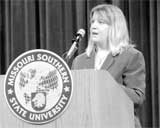Church tries for revival

Dr. Jennifer Wynot speaks to Missouri Southern on the topic of the Orthodox church in Russia. She discussed its relations with other religions and its attempts to have its status protected.
On Oct. 25, Dr. Jennifer Wynot lectured Missouri Southern on religion after the communist era.
Her lecture, “Religion After Communism: The Status of the Russian Orthodox Church in Post-Communist Russia” focused on how the Orthodox Church is trying to make a come back with Russia’s society.
Property holdings were a main theme in her opening. She told the audience how during the Bolshevik regime, land was taken from religious organizations and either given to neighboring villagers or to the state.
“The return of Church property is still being fought over in the court system,” she said.
Problems remain to be solved if the Church wants to continue its revival, she said. The Orthodox Church needs to reestablish legitimacy to the Russian people.
Monks who are trying to regain land claims have to compensate the villagers for their land.
On Sept. 24, Russian Parliament passed a law to make land disputes easier to decide. Land is being transferred without cost to religious organizations for as long as they are in progress. They are getting free rent but no ownership, she said.
Baptist, Jehovah Witness and Mormon missionaries are being sent into Russia. Some Russians say these religions are a “pure form of Christianity.” Others say they are a threat, she said.
In September 1997, Parliament prohibited religions from practicing if they were not active in Russia’s past. Four religions remain as nationally recognized: Islam, Orthodoxy, Buddhism and Judaism.
“The Church is trying to come to terms with it’s Soviet past,” she said.
She said many people have suspected leaders of the Church of being KGB informants. When Patriarch Alexei II, head of the Russian Orthodox Church, did not affirm nor deny this claim, people lost faith in the Church.
Reconciliation between the in-state and overseas churches has been attempted. Once the Iron Curtain fell, they were supposed to be united, but each church believes the other is illegitimate.
“Many feel the Church is being used by the state as a propaganda tool,” she said.
In order to bring the Church into the eyes of Russia’s citizens as a positive institution, it has set up soup kitchens, homes for the needy and other charitable works.
In August 2003, the Church declared a day of charity in hopes to bring people back to doing good deeds for others. It has become active in helping war victims. People have started to wear crosses visibly and proudly declare themselves of the Orthodox religion, she said.
But, people are still not going to church. Seven percent of those who do claim themselves as Orthodox go to church. Many of them do not know Orthodox doctrines, she said.
“Change has been slow and many have resisted,” she said.
Religion classes have been thought about. An after school elective class, if proven successful, would prompt authorities to build an Orthodox high school.
Several universities, seminaries, monasteries and women’s institute are dedicated to teaching the religion. The Church has been active in publishing books on theological history and doctrines.
“The Orthodox Church in Russia is experiencing a renaissance in the post-communist era,” she said.
Religious authorities have to be careful as to not seem as a mouthpiece for the government, she said. The Church is on its way to becoming reestablished in the 21st century. Russia has more nuns than monks at the present time and many young people are going into monasteries.
“People view the monasteries as being pure,” she said. If you grow up in a religious atmosphere, it’s not surprising people would join that way of life. It’s a very honorable way to live.
“Now there is true freedom of religion,” she said. “The churches are open.”
Your donation will support the student journalists of Missouri Southern State University. Your contribution will allow us to purchase equipment and cover our annual website hosting costs.















